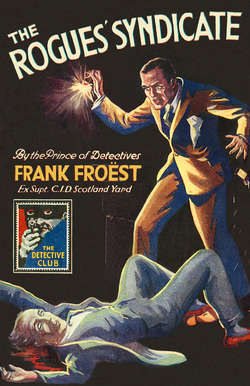Читать книгу The Rogues’ Syndicate: The Maelstrom - Frank Froest, Frank Froest - Страница 7
INTRODUCTION
ОглавлениеFOR the lover of a really exciting detective story, here is good fare. For those a little tired of New York’s Underworld, here is more familiar ground: west-end streets and restaurants; respectable suburban villas; purlieus of Bloomsbury—an east-end we know to be true. Here are no puppets, but human, vivid figures playing out a drama of love and hate and greed, the sleuths of Scotland Yard hot on their trail and the shadow of the hangman’s noose before their eyes.
Ex-Superintendent Frank Froëst tells his story in a straightforward way. There are no hidden clues, no sudden dénoue-ments to put the reader deliberately on a false trail. He shares the excitement of the hunt, knows all there is to know, and has every chance to spot the murderer and solve the mystery of the forged cheques.
The adventures of Jimmie Hallett are sufficiently exciting in all conscience to satisfy the most exacting of detective story ‘fans’. Against a familiar London background, we have here a tale of breathtaking adventure—knifing, arson, racing-taxicabs, and shooting-to-kill. Can Weir Menzies, that genial detective with the churchwarden manner, even with all the resources of Scotland Yard behind him, succeed in outwitting a gang of international crooks of whose very numbers he is ignorant?
His efforts to unravel the tangle lead him to the unsavoury atmosphere of Shadwell and the docks. His quarry, after slipping through the cordon of police, is run to earth in a Chinese opium den. There is a cellar in Brixton, a furiously-driven taxi with a dead woman for fare—in fact, a constant succession of thrills.
Apart from the tale, to make the acquaintance of Mr Weir Menzies is a pleasure in itself. Weir Menzies, the model husband, the respectable and respected citizen of Tooting, with his dog and his roses and his dislike of late hours; Weir Menzies, with his calm, unhurried manner, refusing to be rushed, refusing to be ruffled, relying on perseverance and dull routine and plain common sense. Surely here is a detective after everyone’s heart.
Detection as a science and not a freak accomplishment is expounded in this story with a wealth of convincing argument. As a vindication of official procedure it is worth reading alone. It is written with genuine knowledge of the methods of police detection, sometimes dull and laborious in themselves: the careful sitting of a mass of irrelevant detail; the intelligent consideration given to the most trivial scrap of information; the interesting survey of the case from time to time by highly-placed officials (the C.I.D. believes firmly that two heads are better than one, and sometimes three than two); then finally the close and oft-repeated scrutiny of the points of the case when it takes definite shape in their hands, to ensure that it is proof against the slings and arrows of the defending counsel.
It is a fact of real life, in this country at least, that a criminal may—and not infrequently does—escape justice, in spite of widespread belief in his guilt, through the inability of the police to bring definite proof in support of their theory. A recent tightening of the law has still further restricted their powers of questioning suspects—never at any time in England have they been permitted to indulge in the protracted and intensive methods of examination in vogue on the continent and in America—and thus made it increasingly difficult to obtain the proofs necessary to bring the criminal to justice.
The Rogues’ Syndicate illustrates clearly the difficulty under which the police sometimes labour in this respect—their inability to obtain sufficient evidence to prove their charge to a jury—and as an intelligent exposition of this aspect of our criminal law should be read with enjoyment by everyone interested in crime and detection.
Accuracy of detail is ensured by the fact that the author, ex-Superintendent Frank Froëst, was over thirty years at Scotland Yard. His triumphs range from his successful round-up of Jabez Balfour in the Argentine in connection with the Liberator frauds to his equally dramatic success in the Crippen case, the sensational arrest of Dr Crippen—in which wireless played an important part being planned by this resourceful detective in his room at Scotland Yard.
THE EDITOR
FROM THE ORIGINAL DETECTIVE STORY CLUB EDITION
April 1930
